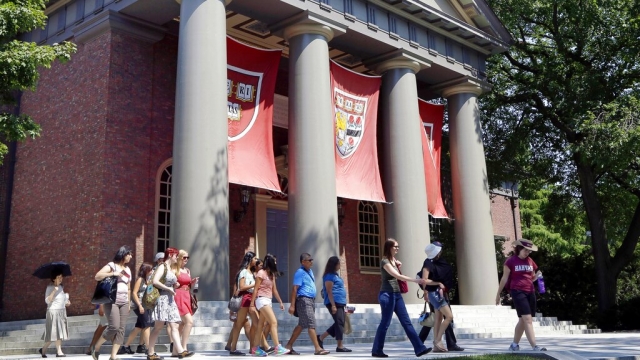As the war in the Middle East rages into its second week, colleges and universities across the United States are dealing with increasing pressure to respond to the crisis, while at the same time balancing free speech rights of students on campus.
Harvard University in Cambridge, Massachusetts, has been thrust into the spotlight in recent days over how it has responded to the war and student groups.
"It's been very hard," said Boaz Barak, a professor of computer sciences at Harvard. "Every Israeli knows people who have been impacted."
Boaz was born in Israel and has been listening to Israeli students who, in recent days, have expressed concerns of safety at the prestigious Ivy League School.
"They feel unsafe," Barak explained. "If someone thinks it's OK to kill my family, why can I be safe in the same campus?"
SEE MORE: America's reaction to escalating violence amid the Israel-Hamas war
The turmoil at Harvard all stems from a letter sent on Oct. 7 after Hamas attacked Israel. Harvard Palestine Solidarity Groups released a joint statement reading:
"We, the undersigned student organizations, hold the Israeli regime entirely responsible for all unfolding violence … Today's events did not occur in a vacuum. For the last two decades, millions of Palestinians in Gaza have been forced to live in an open-air prison … We call on the Harvard community to take action to stop the ongoing annihilation of Palestinians."
Harvard Officials did not initially condemn the letter, which has created outrage among some students and donors.
"That made the Jewish students feel very alone and that's why I felt compelled to speak up," Barak said.
In recent days though, Harvard's President Claudine Gay released a video statement condemning the attacks.
"People have asked me where we stand. Let me be clear. Our university rejects terrorism. That includes the barbaric atrocities perpetrated by Hamas," Gay said in her video.
It all appears to have come too late for Harvard's endowment, though, as many donors — like the Wexner Foundation — have severed ties with the university. Wexner said in a statement to Scripps News, "We are stunned and sickened at the dismal failure of Harvard's leadership to take a clear and unequivocal stand against the barbaric murders of innocent Israeli civilians."
SEE MORE: Palestinian Americans react to the conflict between Israel and Hamas
Charles Henebry studies social movements at Boston University. He said student protests, like the ones that happened in the 1960s during the Vietnam War, are nothing new to college campuses. But the conflict in the Middle East is more challenging to navigate.
"[The issue is] a tricky one," Henebry said. "Because we don't have a model to fall back on. You have student groups strongly on both side of the issue, you have donors, you have faculty."
Thousands of students from coast to coast have participated in rallies over the last two weeks, in support of both Israelis and Palestinians. All of this has now thrust colleges and universities across the country into a larger debate on whether institutions of higher education should take a stance on the situation in the Middle East.
Alex Morey serves as director of campus rights advocacy at the Foundation for Individual Rights and Expression. She said other colleges should learn from the ongoing situation at Harvard.
"This is one of those situations where there is no right way for a university to weigh in without getting backlash," Morey noted. "Universities can step in and say 'We have the resources to set the table, to teach students the skills to engage across these huge chasms of difference.'"
Trending stories at Scrippsnews.com





